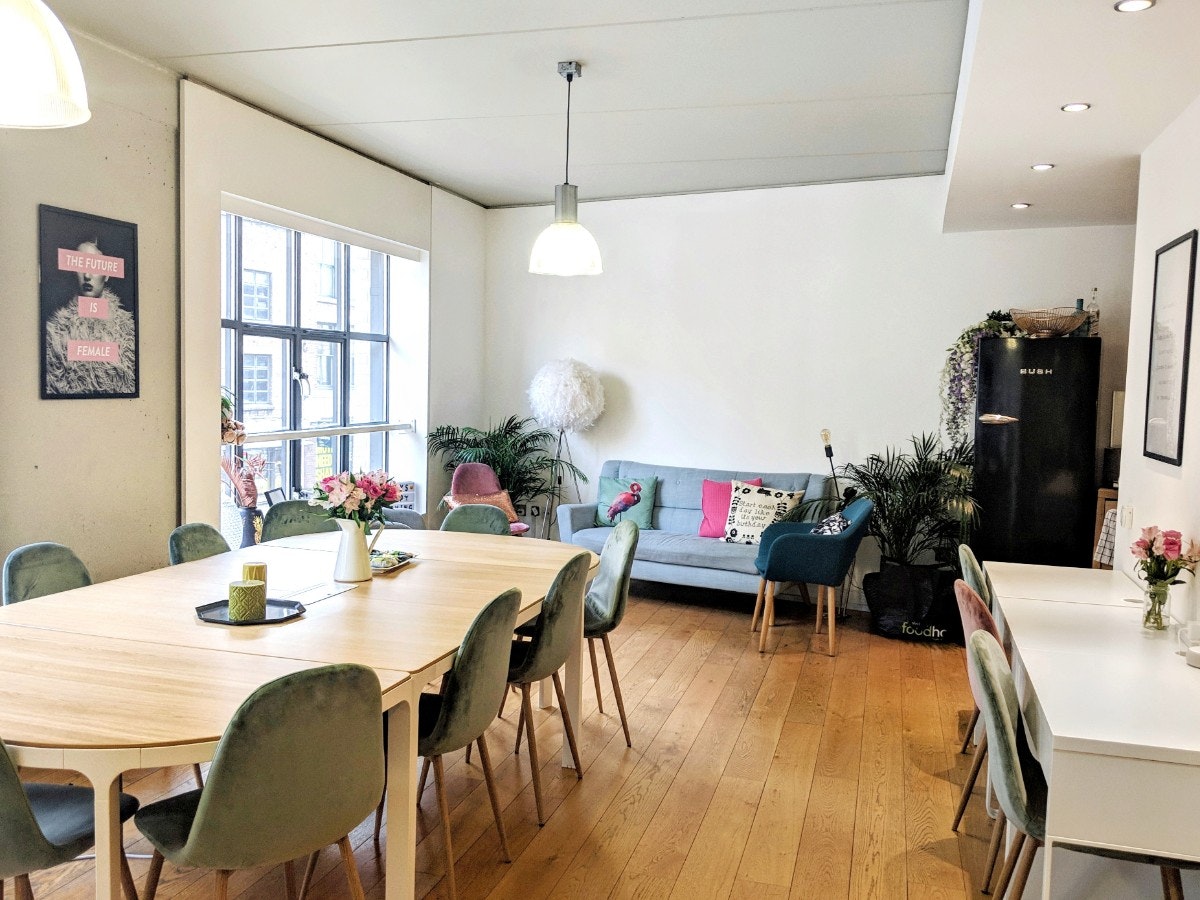Factory Berlin has, for years, been one of the hottest coworking spaces in the German capital, with hundreds of startups renting space in its 14,000-square-meter location in Görlitzer Park or its smaller site nearby.
But this week, both are pretty much empty amid government orders that people should work from home to help prevent the spread of the coronavirus pandemic that has swept through the world, infecting over 780,000 people and killing more than 37,000.
For Hannah Ashford, Factory Berlin’s head of community, it’s more than a short-term inconvenience. It’s going to have a big financial impact on the business as people either cancel membership or shift to digital-only “hold” membership.
“We’re going to have a big transition from people switching from their full membership to the hold membership, and of course that will have a big financial impact on us,” she tells Sifted.
Factory Berlin, which calls itself an innovator community, is just one of the hundreds of spaces that are taking a big hit from the coronavirus lockdown, which puts pressure on short-term finances but also calls into question long-term business models.
As working from home and social distancing have become the new normal in a matter of weeks, the previously de rigueur idea of “shared office space” is, for many, looking increasingly unappetising.
People are already (again) calling the death of WeWork, the most notorious of coworking spaces. The US company's bonds are being priced at 55 cents on the dollar, meaning investors are expecting to get back just over half of the money lent to the company (i.e. a big default).
In the UK, Second Home, which has recently taken a financial blow due to cost overruns at its new office in Los Angeles, temporarily closed all its London sites this month. Spaces such as 42workspace in Rotterdam and Republikken in Denmark are some of the others that are largely empty and recommending people work from home.
A survey of over 14,000 coworking spaces in 172 countries worldwide by Coworker, a coworking marketplace website, found that 72% of spaces said they have witnessed a significant drop in the number of people working from their space since the outbreak.
At the same time, 41% of coworking spaces reported a negative impact on membership and contract renewals since the outbreak. And 67% of spaces have experienced a drop in the number of new membership enquiries.
In the UK, Plexal — one of the largest coworking spaces in Europe — 70 out of 123 member companies urgently need access to grant funding to cope with the disruption caused by coronavirus. Its managing director, Andrew Roughan, wrote a letter to the UK government last week calling for urgent support for the country's 5,320 coworking spaces.
New digital offerings
Coworking spaces without the in-person conversation, quality coffee, delectable food and flex desks may not seem like they have much to offer.
But many have long prided themselves on the strength of their communities — and communities, they say, can be online as well as offline.
So all these spaces have been in overdrive in recent weeks to keep members engaged at home and really offer them something.
One of the most common ways to keep members socially engaged is hosting day-long Zoom rooms. People may be working from home, but they’re still connected in a way that mimics physical presence as best as possible.
At Wunderhaus — a space in Berlin for freelancers and creatives with families — founder Shirley Erskine is also focusing on providing virtual classes and workshops, sourced from the members themselves.
“Our Wunder Studio with classes for children and mothers is very popular and we are speaking with our freelancers to create virtual classes,” Erskine says. “We try the best we can to support our freelancers during this difficult time.”
Many coworking spaces whose offerings extend well beyond a physical space are ramping up those additional services.
Although Factory Berlin is still open, Ashford says that its “biggest priority” this week is to look at getting as many event formats as it can online. Not only does that mean hosting workshops and educational events, but it also means providing a platform for hanging out.
“Every Friday we have Check Out Drinks, where the community comes together to see out the week,” she says. “We’re going to do a live stream of Check Out Drinks from Riverside Studios. One of the guys on our team, James, will be doing a DJ set and we’ll stream it.”
Second Home in London, where Sifted worked until it shut last week, is making huge efforts to spice up the members’ Slack community. There are daily emails filled with reading lists, online classes and guides to remote working.
The power of community
Jakob Assmann, chief executive of Impact Hub Munich, says that, far from being a disaster, the coronavirus pandemic will prove the importance of just the type of communities that the good coworking spaces are offering.
“I think people will realise in these times of crisis how much more resilient they are once they are not just out for themselves,” Assmann says. “We’ve always told them, but maybe they never felt it that much. Now they feel what it means to be connected.”
The show of community also extends beyond individual spaces and into the global network of coworkers.
Ashford and the Factory Berlin team took part in a meeting with all the Google for Startups hubs, where the exchange of insight and information proved helpful in guiding Factory’s strategy.
“A lot of [Google for Startups hubs] got together and shared some financial strategies, saying, ‘Okay, here’s a high risk, medium risk, low risk scenario and here are things to consider’,” Ashford says. “We’re being guided by our network in terms of making those hypotheses about how things could change and develop.”
Coworking giants like Impact Hub have the advantage of utilising their own global network of hubs — all of which are currently under location-specific government regulations.
The Milan hub — having been through unprecedented circumstances several weeks earlier — had plenty of insight to share with the other hubs in terms of shifting event formats online and continuing operations during a crisis.
“There was good communication before, but now it’s really focused,” Assmann says. “We’ve established channels for all the problems we have, from design of posters to wash your hands, to basic scenario planning and the innovation formats.”
Short-term financing
Regardless of whether or not the coronavirus pandemic will really highlight the power of coworking communities, the drop in membership and use of event spaces short term is still likely to cause a cash crunch.
With most physical spaces entirely closed, event bookings being cancelled and members jumping ship, companies find themselves scrambling to figure out how they’ll pay rent and team salaries.
The majority in Germany are applying for a specific type of government aid — or Kurzarbeit — that helps employees make up lost income and reduces their hours without severing their work contracts. Others are doing the same across Europe.
Pauline Roussel, chief executive of Coworkies, joins a call with community managers and founders of coworking spaces every Friday.
Roussel cofounded Coworkies in order to bring the world’s coworking spaces and coworkers together in one digital community, and she’s become especially active in learning how its members are faring.
According to Roussel, the vast majority of spaces are in talks with their landlords with the hopes of scoring a pause on rent, or at the very least, a reduction.
“It’s about coming up with an agreement or middle ground for both so it doesn’t put the space in danger or put the landlord in a complicated situation,” Roussel says. “It’s not in the interest of the landlord to lose the coworking space.”
Although many are still unclear as to whether or not landlords will be flexible, some spaces have already received positive answers.
John Neilan, manager and cofounder of tuesday coworking, says his landlord has been flexible given the circumstances. He also notes that it is the deliberate decision of members to stay onboard in a show of solidarity that is keeping his homey, boutique space afloat.
“Unsurprisingly, the newer members who haven't been around long enough to make friends are the ones jumping ship,” Neilan says.
“I've had a few of the older heads message me to say they won't be coming to the space anymore but will continue paying their membership because they don't want to see us go under. As long as our team offices [private offices for one to six people] don't quit, we should be fine.”
A lasting impact
The lingering fear is that the pandemic will go on for many months (or even years), and even on the other side, our working patterns may fundamentally change in a way that is bad for the business model of coworking spaces.
But with the future so uncertain, for now at least, many of them are seeing it as an opportunity to build new communities and find out how to help people who want flexible working spaces in a different way.
“It’s a difficult time, but I also believe there’s a lot to learn from it,” says Roussel from Coworkies. “It’s a way for us to get creative and understand how we can reinforce our communities.”
This article was produced by Julia Neuman in collaboration with Silicon Allee, which supports a community of international startups based in Berlin.


